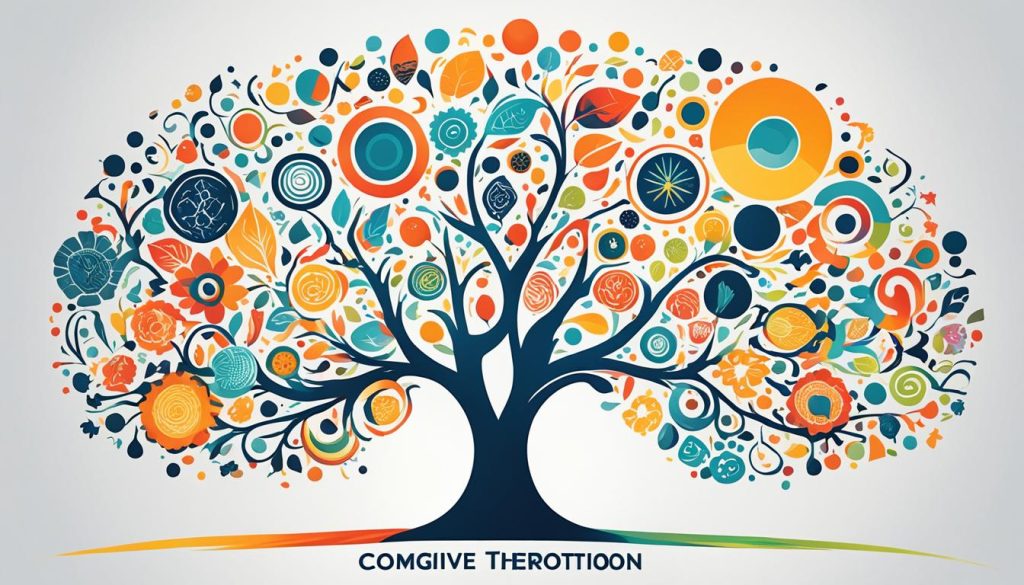When it comes to addiction recovery, choosing the best counseling options is a crucial step towards long-term sobriety and wellness. Addiction recovery counseling plays a vital role in helping individuals make positive mental and behavioral changes, guiding them towards a healthier and addiction-free life.
Therapy and counseling offer a variety of benefits for addiction recovery, including engagement in treatment, incentives for sobriety, modification of attitudes and behaviors towards substance abuse, and the development of essential life skills. In fact, the National Institute on Drug Abuse recognizes behavioral therapy and counseling as essential components of addiction recovery.
There are various types of addiction treatment programs available, each tailored to meet the unique needs of individuals seeking recovery. From medical detox and inpatient rehab to outpatient rehab and online rehab, there are counseling options available for every stage of the recovery journey. Factors such as the severity of addiction and individual circumstances will play a role in determining the most suitable counseling option.
Key Takeaways:
- Choosing the best counseling options is crucial for addiction recovery.
- Therapy and counseling offer important benefits such as engagement in treatment and modification of attitudes and behaviors.
- There are various types of addiction treatment programs available, including medical detox, inpatient rehab, and online rehab.
- The severity of addiction and individual circumstances influence the choice of counseling options.
- Seeking professional help is essential in determining the most suitable treatment plan.
Types of Behavioral Therapies for Addiction Recovery
Behavioral therapies are crucial in helping individuals overcome drug and alcohol addiction. These evidence-based counseling approaches focus on addressing underlying issues, changing negative behaviors, and promoting long-term recovery. There are several effective types of behavioral therapies that are commonly used in addiction recovery:
- Cognitive Behavioral Therapy (CBT): CBT is a widely recognized counseling technique that helps individuals identify and modify negative thinking patterns and behaviors related to addiction. It aims to promote sobriety by addressing underlying issues and developing healthier coping mechanisms.
- Contingency Management (CM): CM is a behavior therapy that incentivizes positive behaviors, such as sobriety, through rewards and reinforcement. It can strengthen recovery by providing individuals with motivation and tangible rewards for maintaining abstinence.
- Motivational Interviewing (MI): MI is a counseling technique that empowers individuals to find their own inner motivation for change. It helps individuals overcome ambivalence and increase readiness for addiction recovery, promoting lasting behavioral change.
- Dialectical Behavioral Therapy (DBT): DBT combines elements of CBT with individual therapy and motivational enhancement therapy. It is effective in treating individuals with co-occurring mental health disorders and substance abuse issues. DBT focuses on building self-esteem, regulating emotions, and developing skills for behavior change.
- Rational Emotive Behavior Therapy (REBT): REBT is a form of cognitive behavioral therapy that emphasizes identifying and challenging irrational beliefs and thoughts that contribute to addiction. It helps individuals develop a more rational and adaptive mindset, supporting addiction recovery.
- Eye Movement Desensitization and Reprocessing (EMDR): EMDR is a unique therapy approach that helps individuals process traumatic experiences that may contribute to addiction. It uses bilateral stimulation techniques, such as eye movements, to facilitate emotional healing and reduce the impact of traumatic memories.
These different types of behavioral therapies provide individuals with effective tools and strategies to address addiction and achieve long-term recovery. By targeting negative thought patterns, behaviors, and underlying issues, these evidence-based counseling techniques promote positive change and support individuals on their journey to sobriety.
Different Therapy Approaches for Addiction Treatment

When it comes to addiction treatment, there are various therapy approaches that can be utilized to support individuals in their recovery journey. Therapy plays a fundamental role in helping individuals address the underlying causes of addiction and develop effective coping mechanisms. In this section, we will explore three key therapy approaches: individual therapy, group therapy, and family counseling.
1. Individual Therapy
Individual therapy, also known as one-on-one therapy, provides a focused and personalized approach to addiction recovery counseling. In these sessions, individuals have the opportunity to work closely with a therapist to explore the root causes of their addiction and develop strategies for managing cravings and triggers. Through individual therapy, personalized addiction counseling can be tailored to meet the specific needs and circumstances of each individual. This approach allows for a safe and confidential space where individuals can openly discuss their experiences and emotions, ultimately leading to a deeper understanding of their addiction and sustainable recovery.
2. Group Therapy
Group therapy offers a supportive and collaborative environment for individuals in addiction recovery. This therapy approach brings together a group of individuals who are facing similar challenges and provides a space for them to share their experiences, learn from one another, and build meaningful connections. Group therapy fosters a sense of belonging and reinforces the understanding that individuals are not alone in their journey towards recovery. By participating in group discussions and activities, individuals can gain valuable insights, receive support, and develop important social skills that are crucial for long-term sobriety.
3. Family Counseling
Addiction not only affects the individual struggling with substance abuse but also has a significant impact on their loved ones. Family counseling is an essential part of addiction recovery as it focuses on healing and rebuilding relationships within the family system. Through family counseling sessions, family members can gain a better understanding of addiction, develop healthy communication patterns, and learn strategies to support their loved one’s recovery. Family counseling provides a platform for open dialogue, forgiveness, and empathy, facilitating the path towards a healthier and more supportive family dynamic.
Incorporating a combination of individual therapy, group therapy, and family counseling into addiction recovery treatment programs allows for a holistic and comprehensive approach. Each therapy approach brings its own unique benefits and can be tailored to meet the individual needs and preferences of those seeking addiction recovery counseling services.
Specialized Therapies for Addiction Recovery

In addition to traditional therapy approaches, there are specialized therapies that can enhance addiction recovery. These therapies provide unique approaches to healing and can address specific needs and challenges in addiction recovery.
Cognitive and Dialectical Behavioral Therapy (CBT and DBT)
Cognitive Behavioral Therapy (CBT) and Dialectical Behavioral Therapy (DBT) are evidence-based counseling approaches that focus on identifying and changing negative thought patterns and behaviors. These therapies can help individuals with addiction develop healthier coping mechanisms and promote long-term recovery.
Creativity-Based Therapy (Art and Music Therapy)
Creativity-based therapies, such as art therapy and music therapy, tap into the power of artistic expression to support addiction recovery. These therapies allow individuals to explore their emotions, express their experiences, and develop new ways of coping.
Physical Therapies (Biofeedback and EMDR)
Physical therapies like biofeedback and Eye Movement Desensitization and Reprocessing (EMDR) can be beneficial for individuals with addiction. Biofeedback helps individuals learn to control physiological responses to stress, while EMDR can help process traumatic experiences that may contribute to addiction.
Experiential Therapies (Animal Therapy, Adventure Therapy, and Music Therapy)
Experiential therapies provide individuals with addiction recovery opportunities to engage in impactful experiences. Animal therapy involves interacting with animals to promote emotional well-being. Adventure therapy utilizes outdoor activities and challenges to build resilience and personal growth. Music therapy utilizes music and sound to support emotional expression and healing.
Holistic Therapy
Holistic therapy focuses on the overall well-being of individuals in addiction recovery. It integrates various treatment modalities such as mindfulness, nutrition, exercise, and alternative therapies to promote physical, emotional, and spiritual healing.
Motivational Enhancement Therapy
Motivational Enhancement Therapy (MET) is a counseling approach that helps individuals tap into their intrinsic motivation for change. Through collaborative conversations and personalized feedback, MET supports individuals in making positive changes and fostering long-term recovery.
These specialized therapies, when combined with other addiction counseling programs, offer a comprehensive and personalized approach to addiction recovery. They address the unique needs of each individual and provide additional tools for long-term sobriety and overall well-being.
| Specialized Therapy | Description |
|---|---|
| Cognitive and Dialectical Behavioral Therapy (CBT and DBT) | Focus on identifying and changing negative thought patterns and behaviors. |
| Creativity-Based Therapy (Art and Music Therapy) | Utilize art and music as a means of expression and exploration. |
| Physical Therapies (Biofeedback and EMDR) | Use biofeedback and EMDR to address physical and emotional aspects of addiction recovery. |
| Experiential Therapies (Animal Therapy, Adventure Therapy, and Music Therapy) | Engage individuals in impactful experiences to promote emotional growth. |
| Holistic Therapy | Focus on overall well-being, integrating various treatment modalities. |
| Motivational Enhancement Therapy | Tap into intrinsic motivation for change through collaborative conversations. |
Conclusion
Choosing the best counseling options for addiction recovery is a deeply personal journey, influenced by various factors such as the severity of addiction, treatment history, financial ability, and individual circumstances. To ensure the most effective treatment plan, it is crucial to seek professional help from doctors, therapists, or licensed addiction treatment professionals.
Whether it’s individual therapy, group therapy, family counseling, or specialized therapies, the overarching goal is to provide comprehensive and tailored addiction recovery counseling that supports individuals in achieving long-term sobriety and overall wellness. These counseling options offer valuable guidance, strategies, and tools to help individuals overcome addiction and establish a healthy, fulfilling life.
Remember, addiction recovery is not a journey you have to face alone. There are dedicated counseling services available to provide the support and guidance you need throughout your recovery process. By reaching out for help, you are taking a courageous step towards a brighter and healthier future.
FAQ
What role does addiction recovery counseling play in the treatment of drug and alcohol addiction?
Addiction recovery counseling plays a crucial role in the treatment of drug and alcohol addiction by helping individuals make positive mental and behavioral changes, leading to long-term recovery.
What are the benefits of therapy and counseling for addiction recovery?
Therapy and counseling provide important benefits, including engagement in treatment, incentives for sobriety, modification of attitudes and behaviors towards substance abuse, and the development of essential life skills.
What types of addiction treatment programs are available?
There are various types of addiction treatment programs, including medical detox, inpatient rehab, outpatient rehab, online rehab, court-ordered rehab, sober living programs, aftercare services, teen drug rehab, and holistic drug rehab.
What are some effective behavioral therapies for addiction recovery?
Some effective behavioral therapies for addiction recovery include Cognitive Behavioral Therapy (CBT), Contingency Management (CM), Motivational Interviewing (MI), Dialectical Behavioral Therapy (DBT), Rational Emotive Behavior Therapy (REBT), and Eye Movement Desensitization and Reprocessing (EMDR).
What therapy approaches are used in addiction treatment?
Therapy approaches for addiction treatment include individual therapy, group therapy, and family counseling.
Are there any specialized therapies for addiction recovery?
Yes, there are specialized therapies such as cognitive and dialectical behavioral therapy (CBT and DBT), creativity-based therapy (art and music therapy), physical therapies like biofeedback and EMDR, experiential therapies such as animal therapy, adventure therapy, or music therapy, and holistic therapy that focuses on overall wellness.
How do I choose the best counseling options for addiction recovery?
Choosing the best counseling options for addiction recovery is a personal and individualized process, based on factors such as the severity of addiction, treatment history, financial ability, and personal circumstances. It is important to seek professional help from doctors, therapists, or licensed addiction treatment professionals to determine the most suitable treatment plan.
Where can I find counseling services for addiction recovery?
Counseling services for addiction recovery can be found through doctors, therapists, or licensed addiction treatment professionals who specialize in addiction counseling.

